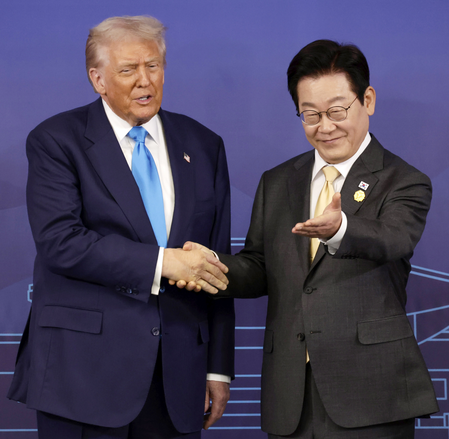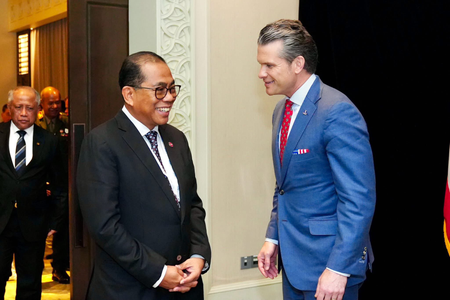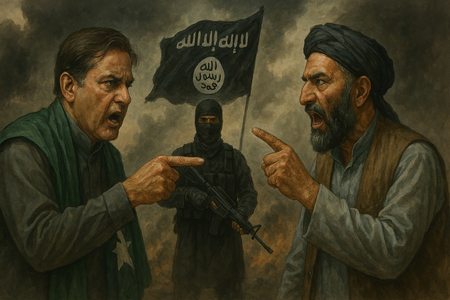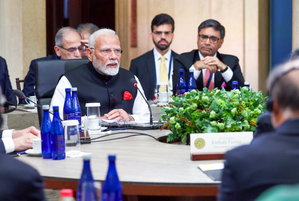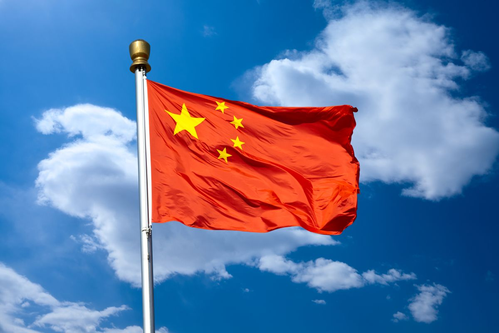
London, Aug 17 (IANS) Burmese artist Sai was three weeks back celebrating the opening of an art exhibition he had curated with his wife at one of the top galleries in Thailand. However, their exhibition regarding authorities’ repression was censored after angering the Chinese government.
The couple has now fled to the UK, where they plan to request asylum. According to the couple, Thai police are looking for them. However, a police spokesperson denied having knowledge about it. Human rights advocates have criticised the situation, terming it an example of transnational repression, BBC News reported.
Sai said his exhibition, which featured exiled artists from countries like China, Russia, and Iran, opened at the Bangkok Arts and Cultural Centre on July 26 and witnessed the frequent visits of Chinese embassy representatives along with Bangkok city officials.
The show, titled ‘Constellation of Complicity: Visualising the Global Machine of Authoritarian Solidarity’, aims to showcase how authoritarian regimes work together in repression, according to one official description.
Sai accused Chinese officials of registering complaints about works by Tibetan, Uyghur and Hong Kong artists, and initially called for a complete shutdown of the show. However, he stated that the arts centre managed to negotiate a compromise that enabled the continuation of the exhibition after sensitive artworks and elements of art installations were removed.
According to the BBC News report, several artists’ names in the exhibition were covered up with black paint in the descriptions of artworks. Furthermore, the artists’ homeland description was partially covered with black paint to hide references to Hong Kong, Tibet, and Xinjiang.
The majority of the censored artworks included the artworks of Tibetan artist Tenzin Mingyur Paldron. Furthermore, television screens placed during the exhibition to showcase films by the artist, including one about the Dalai Lama, had been switched off.
Tibetan and Uyghur flags, a novel about a Tibetan family in exile, and a postcard about China, Israel and Xinjiang were also removed from the exhibition. Speaking to BBC News, a gallery staff member said that many people came to see the exhibition in recent days after censorship news went viral online.
There was an email where the centre said that they had been “warned that the exhibition may risk creating diplomatic tensions between Thailand and China”. The email also mentioned that they made the adjustments “due to pressure from the Chinese embassy” transmitted through the Thai Foreign Affairs Ministry and the Bangkok city government, which is the centre’s main supporter.
In response to BBC queries, a statement by the Chinese embassy accused the exhibition of openly promoting Tibetan, Uyghur and Hong Kong independence. It further stated that Thailand’s “timely measures” demonstrated that such a “false notion” has “no market internationally and is unpopular.”
It further stated that the exhibition “disregards facts… distorts China’s policies on Tibet, Xinjiang, and Hong Kong, and harms China’s core interests and political dignity”. The statement did not refer to allegations that its officials had pressured Thai authorities and the arts centre.
The curators of the show and the artists of the exhibition have rejected accusations made by China. Paldron said his films “conveyed stories from the heart and sent a message of global solidarity.” Paldron further stated that the censorship was part of a Chinese “campaign of erasure and suppression” of Tibetans around the world.
Speaking to BBC News, Sai said instead of independence from China, “we promote freedom of expression, self-determination, and self-identification… basic human rights.” He further stated, “Our exhibition gives space for artists who resist authoritarianism. These are voices often silenced in their own country. The fact that the Chinese Communist Party tries to shut it down proves the very point they are making.”
Sai and his wife fled to the UK as they were worried about being deported back to Myanmar, where Sai believes he will be persecuted for his activism against the junta. Two days after the exhibition began, the couple, while heading to their home in Bangkok, realised that Thai police were looking for them.
The couple received texts from gallery staff informing them about the police’s visit to the exhibition and that officers had asked for the contact numbers of the couple. At the moment, Sai said that “we realised we had to leave the country”. The couple booked tickets for the earliest flight to the UK.
Thailand’s national police spokesman Achayon Kraithong stated that he had not received any information that police personnel were looking for Sai.
The couple had fled their homeland in 2021 following the military coup in Myanmar. The couple had eventually settled in Thailand and decided to put on their art show in Bangkok, as a large Burmese community resides there and also because Sai said, “Thailand plays a critical role to promote peace and stability for Myanmar… It’s a secure place.”
He said that he no longer feels this way.
“Because of our activism, the targeting by authoritarian regimes against us has multiplied… my wife and I have no choice but to seek asylum in the UK.”
Lord Alton of Liverpool, chair of the UK Parliament’s Joint Committee on Human Rights, said that Sai’s case demonstrates the outreach of China’s campaign of “transnational repression” and expressed support for Sai’s bid for asylum, according to the report.
“To pressure an art exhibition to censor exhibits in a cultural centre in another country is an outrageous violation of freedom of expression and should be widely exposed and condemned. The additional fears that this caused for Sai, leading him to flee Thailand for his security, are deeply concerning,” he said.
The Human Rights Foundation has termed the incident an “intimidation” that “reflects a coordinated effort to suppress artistic expression.” Thailand-based activist Phil Robertson called it “outrageous and unacceptable” that Bangkok city officials permitted Chinese censorship.
–IANS
int/akl/vd

